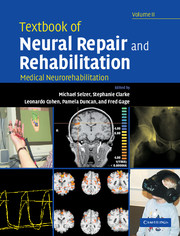Book contents
- Frontmatter
- Contents
- Preface
- Contributors
- Contributors
- Neural repair and rehabilitation: an introduction
- Section A Technology of neurorehabilitation
- Section A1 Outcomes measurement and diagnostic technology
- Section A2 Therapeutic technology
- Section B Symptom-specific neurorehabilitation
- Section B1 Sensory and motor dysfunctions
- Section B2 Vegetative and autonomic dysfunctions
- Section B3 Cognitive neurorehabilitation
- 26 Rehabilitation for aphasia
- 27 Apraxia
- 28 Unilateral neglect and anosognosia
- 29 Memory dysfunction
- 30 Neurorehabilitation of executive function
- 31 Rehabilitation of dementia
- Section C Disease-specific neurorehabilitation systems
- Index
- Plate section
26 - Rehabilitation for aphasia
from Section B3 - Cognitive neurorehabilitation
Published online by Cambridge University Press: 04 August 2010
- Frontmatter
- Contents
- Preface
- Contributors
- Contributors
- Neural repair and rehabilitation: an introduction
- Section A Technology of neurorehabilitation
- Section A1 Outcomes measurement and diagnostic technology
- Section A2 Therapeutic technology
- Section B Symptom-specific neurorehabilitation
- Section B1 Sensory and motor dysfunctions
- Section B2 Vegetative and autonomic dysfunctions
- Section B3 Cognitive neurorehabilitation
- 26 Rehabilitation for aphasia
- 27 Apraxia
- 28 Unilateral neglect and anosognosia
- 29 Memory dysfunction
- 30 Neurorehabilitation of executive function
- 31 Rehabilitation of dementia
- Section C Disease-specific neurorehabilitation systems
- Index
- Plate section
Summary
Disorders of language, that is, of the ability to express mental contents using words and sentences, and to understand others' mental contents expressed in language, are a frequent consequence of acquired and developmental brain damage and dysfunction. The most common cause of acquired language disorders in adults (aphasia) is cerebrovascular disease, followed by traumatic brain injury (TBI) and tumours. Language disorders are also a prominent clinical feature of several other neurological diseases, such as the dementias. The present overview of aphasia rehabilitation deals only with acquired aphasia due to focal brain damage in adults. However, the impact of language disorders in neurology is more extensive, and the scope of language rehabilitation wider than presented here. The rehabilitation of speech disorders due to motor dysfunction is also not discussed here; the distinction from aphasia is quite clear in the case of the peripheral dysarthrias, but becomes muddled in the case of speech disorders due to cortical damage (anarthria, aphemia, apraxia of speech), which may be associated with aphasia.
Aphasia: epidemiology and natural history
The available data about the incidence and prevalence of acquired language disorders are limited. The Copenhagen stroke study indicates that aphasia was present in 38% of a series of consecutive patients with acute stroke (Pedersen et al., 1995). Severe aphasia is a predictor of poor functional outcome in stroke (Paolucci et al., 1996).
Keywords
- Type
- Chapter
- Information
- Textbook of Neural Repair and Rehabilitation , pp. 413 - 423Publisher: Cambridge University PressPrint publication year: 2006

